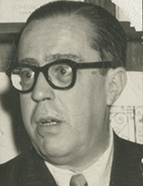

After teaching at various universities both in Brazil and abroad, Sérgio Buarque de Holanda finally joined the Faculty of Philosophy, Sciences, and Letters at the University of São Paulo (USP) as a full professor in November 1958, following a public examination. Responsible for the Chair of General History of Brazilian Civilisation , he also coordinated the editorial project for the General History of Brazilian Civilisation Collection from 1957 to 1972. Holanda was among the founders of the Association of University History Professors, which would later become the ANPUH. At the USP, he established the Institute of Brazilian Studies in 1962, an interdisciplinary research centre where he played a pivotal role in building international networks for Luso-Brazilian studies in Europe, the United States, and Latin America.
The publication of Visão do Paraíso: Os motivos edênicos no descobrimento e colonização do Brasil [ Vision of Paradise: Edenic Motifs in the Discovery and Colonisation of Brazil ] in 1959 coincided with two other seminal works: Antonio Candido de Mello e Souza’s Formação da Literatura Brasileira [ Formation of Brazilian Literature ] and Celso Furtado’s Formação Econômica do Brasil [ Economic Formation of Brazil ] . During this period, Brazil emerged as a cultural powerhouse on the global stage. In the arts, it was propelled by the rhythms of bossa nova , the innovations of cinema novo , the literary boom, concretism , and architectural experimentation. The nation seemed to be finally emancipating itself with the consolidation of a network of public and state scientific institutions.
The launch of the first artificial satellite by the USSR, the Cuban Revolution, and Brazil’s victory in the FIFA World Cup renewed hopes of overcoming the social inequalities and economic disparities inherited or exacerbated since independence. However, Sérgio Buarque de Holanda remained consistently critical of the developmentalist utopia, as he perceived no real resolution to the typical obstacles of economic and political underdevelopment: " We shall also have our own El Dorados. Those of the mines, certainly, but also of sugar, tobacco, and so many other agricultural goods taken from fertile land, as fertile as gold extracted from gravel, until exhausted, without redistributing benefits. The procession of miracles will thus continue throughout the colonial period and will not be interrupted by Independence, nor even by the Republic " ( Visão do Paraíso , 2010, p. 469).
This work is financed by national funds through FCT - Foundation for Science and Technology, I.P, in the scope of the projects UIDB/04311/2020 and UIDP/04311/2020.
